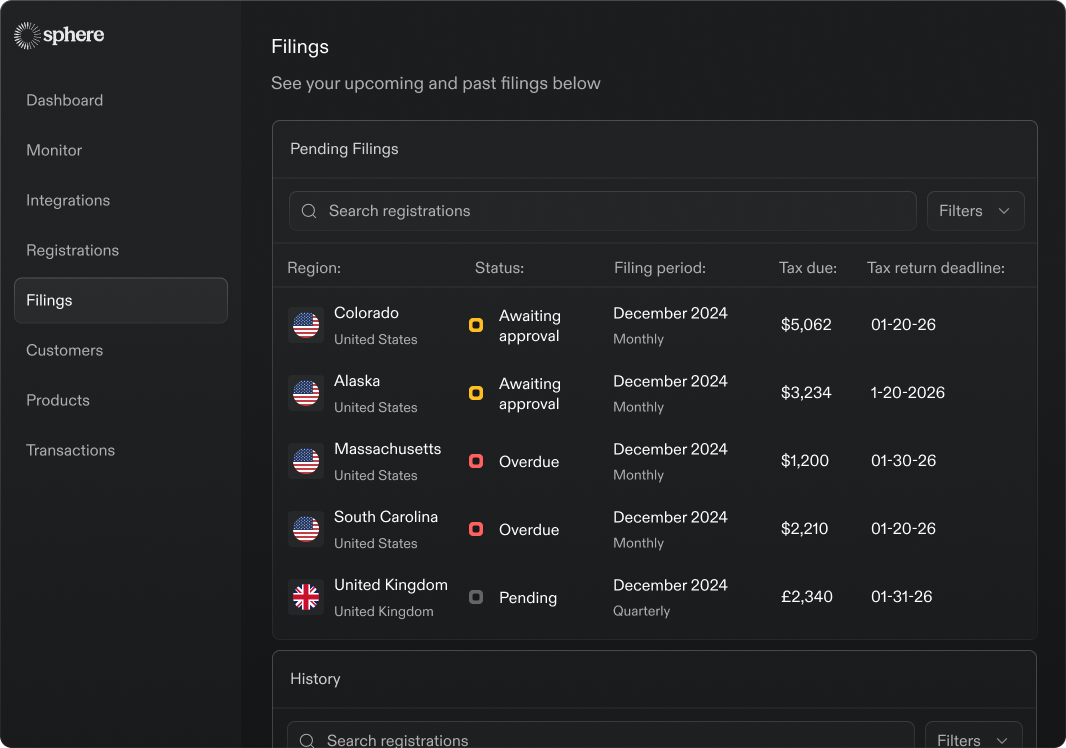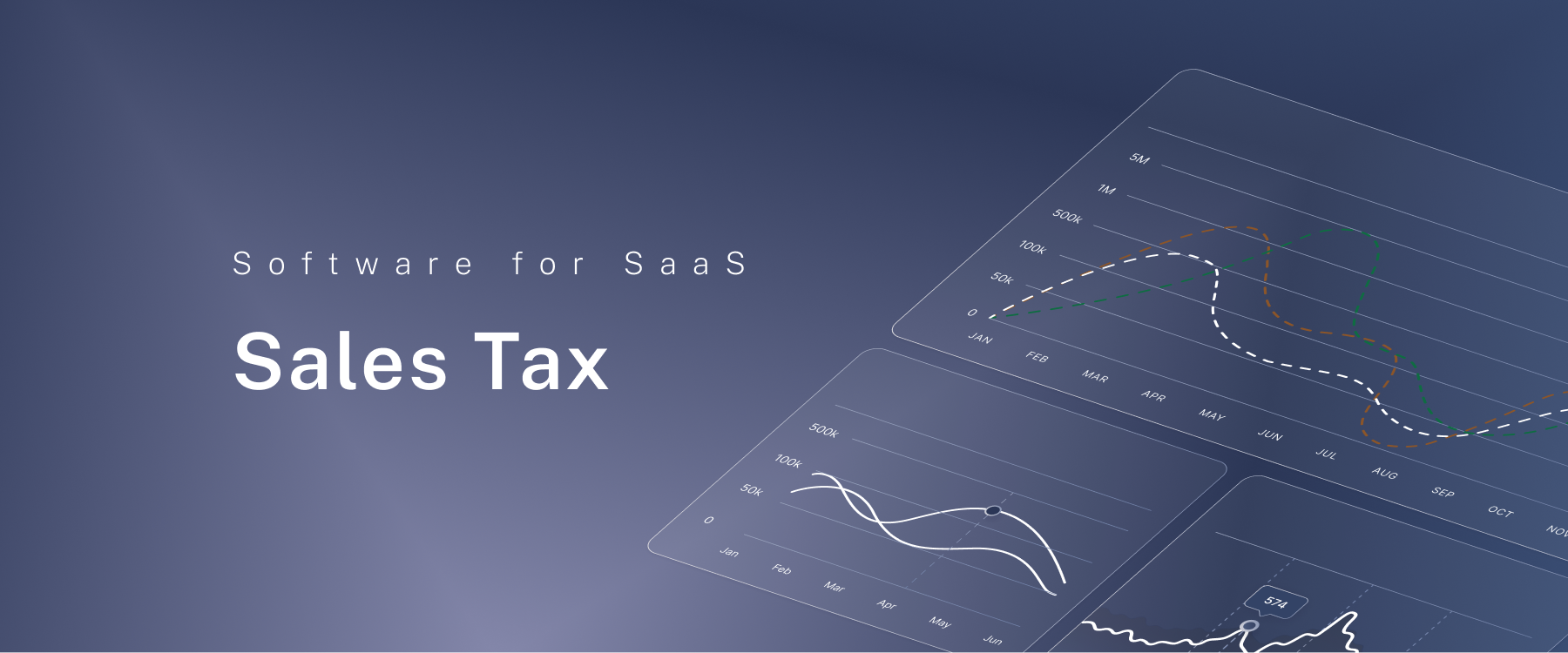.png)
Global expansion means extending your business into new international markets beyond your home country. For SaaS companies, going global opens doors to massive new revenue opportunities, new customer bases, and economies of scale that can transform your business.
But here’s the reality: international growth also brings complex tax compliance and operational challenges that can trip up even seasoned finance teams.
The article covers the key benefits of global expansion, the main challenges you’ll face, and how the right compliance software helps you scale internationally without getting drowned in tax compliance.
What Are the Benefits of Global Business Expansion?
Expanding globally leads to bigger customer bases, higher profitability and the resilience to weather economic storms. Here’s why global market expansion is worth the effort.
Access to New Markets & Customers
Going global dramatically expands your total addressable market (TAM). Instead of competing for a slice of the domestic market, you’re suddenly fishing in a much larger pond. And, depending on your timing, you may be able to pioneer your services in new markets, setting yourself up as the major player in a new country.
Plus, diversified revenue streams decrease your business’s dependence on any single market. For example, take a US-based SaaS company expanding into Europe. They’re not just adding new customers, they're accessing an entirely new market with different needs, price tolerance, and growth potential.
Increased Revenue & Profitability
More markets mean higher sales volume and higher sales volume leads to increased margins. With more markets you can spread your fixed costs, like R&D or product development, across a larger customer base.
You’ll also enjoy pricing flexibility across regions. What customers are willing to pay in San Francisco is likely quite different in pricing the market tolerates in Dubai or São Paulo.
Economics of Scale & Cost Efficiency
SaaS companies especially get all the benefits of centralized teams while still expanding services worldwide. For example, an Ireland-based engineering team and a US-based marketing team may be able to support your international customers without a need for additional headcount.
Also, many regions offer access to lower labor costs, whether for customer support, sales, or technical roles. This isn't about cutting corners—it's about smart resource allocation.
You may also gain vendor leverage. Cloud providers, payment processors, and other vendors often offer discount rates to companies with global scale and higher transaction volumes.
Diversification & Risk Management
Global expansion reduces your reliance on a single marketing, protecting your business from economic downturns or market fluctuations in your home country. Think of it as portfolio diversification. If your domestic market hits a rough patch, growth in other regions can offset any impact. A multinational approach creates more predictable, resilient revenue streams.
Access to Global Talent Pool & Innovation
Going global means you’re no longer bound by the domestic market when hiring new talent. You can recruit the best people in the world, often at competitive rates.
Operating across time zones creates 24/7 business operations. Your support teams can hand off to one another, and even development can continue around the clock.
Diverse perspectives from global team members also lead to stronger product innovation and company culture. Different markets have different needs and desires, and on-the-ground insight helps you build better software for everyone.
Competitive Advantage & Brand Recognition
Having a global presence builds credibility with customers, investors, and partners. Companies that operate internationally are often seen as more established and trustworthy.
Further, being the first to enter a global market gives you the pioneer advantage. You can capture initial market share and establish your brand as the go-to solution, leaving later-arriving competitors rushing to keep up.
From there, enhanced brand recognition from global operations makes you more competitive as you continue to enter new markets, creating a snowball effect as you grow and scale.
The Main Challenges of Global Expansion
While the benefits of global expansion are enticing, CFOs must navigate real hurdles before scaling up to the international stage.
Complex Tax & Compliance Obligations
Each country has unique VAT, GST, or sales tax rules, and they all change frequently. Tax strategies that work for sales tax in the US won’t work for European VAT or Australian GST.
For each new country or jurisdiction, you’ll need to handle tax registration, ongoing filings, all the while staying current with rule changes across multiple jurisdictions. Unlike other economies of scale, the administrative burden only grows as you branch out into new markets.
And the penalty for getting tax wrong is steep. You can face monetary penalties, audits, loss of customer trust, and reputational damage if you fail to comply.
Payment Failures & Currency Issues
One of the drawbacks of selling cross-border is that you often experience high card decline rates, which directly impact your conversion rates and revenue. Most regions prefer local payment methods over international credit cards, and so without those options, you may lose customers at checkout.
Currency fluctuations can also impact your profitability. And if you handle taxes incorrectly at checkout, it may cause payment processing delays or even declines, frustrating customers who are trying to “buy now.”
Organization Complexity & Workforce Management
Setting up local entities is slow and costly. It often requires local legal counsel and ongoing compliance work. Not to mention, managing a global workforce adds HR complexity, with the need to comply with different labor laws, onboarding requirements, and compliance obligations in each market.
These operational challenges can strain lean teams and pull focus away from core business activities.
Market Entry & Cultural Differences
Cultural nuances often affect marketing messaging, sales processes, and product positioning in new markets. What resonates with U.S. customers might fall flat in other markets.
Further, different reasons have compliance regulations beyond taxes and labor law. For example, Europe’s General Data Protection Regulation (GDPR) sets strict rules for the handling of personal data, with other markets having their own requirements.
Cultural misunderstandings when entering a new market can lead to a failed expansion, wasted resources, and a damaged brand reputation.
Typical Expansion Path for U.S. SaaS Companies
Most successful SaaS companies followed a phased approach to expanding cross-border. This global expansion strategy lets you learn and build capabilities in more familiar markets before tackling more complex ones where compliance issues, language barriers, and local customs may prove to be a barrier.
Phase 1 – US → Canada
For US-based businesses, Canada is the natural first step. It’s a neighboring market with a similar culture and (with the exception of Quebec) the same official language. Plus, Canada’s Goods & Services Tax (GST) and Harmonized Sales Tax (HST) are relatively straightforward.
This expansion is a great first step for SaaS companies looking to learn the complexities of international expansion without some of the other barriers that make international expansion difficult.
Phase 2 – English-Speaking Overseas (UK, Australia)
Markets like the UK and Australia have a lower barrier to entry due to a shared language, but be prepared for your business’s first real test of VAT/GST complexity.
When doing business in the UK or Australia, you'll learn to handle different tax rates, registration requirements, and filing obligations while maintaining mostly familiar business practices.
Phase 3 – Broader EU
The European Union represents a larger global market but requires sophisticated multi-country VAT handling skills.
Localization of marketing and payment methods, will be key, and neither are uniform across the region. You’ll also have to learn about the One Stop Shop (OSS), which allows your business to file and remit tax through a single member state, in order to get and stay compliant.
Phase 4 – Asia-Pacific (APAC)
The Asian market offers huge growth potential but with the downsides of a language barrier and diverse localization needs.
Each country in this region often has unique compliance requirements, especially when it comes to taxes, that demand careful planning.
Phase 5 – GCC & LATAM
Doing business in the Gulf Cooperation Council (GCC) (an alliance of Gulf Arab states) or Latin American countries like Brazil is usually late in a company’s expansion plan due to regulatory complexity. Though reforms have been passed, Brazil’s indirect tax system is often considered the most complex in the world. And the GCC’s VAT system is equally complex.
In these markets compliance overhead is significant, but the new opportunities can be substantial for companies ready to handle the complexity. And from there, it’s possible to continue expanding into emerging markets.
How Sphere Simplifies Global Expansion
.png)
The right compliance tools will make international expansion manageable instead of overwhelming. Sphere solves indirect tax for your business so your finance teams can focus on growth, not paperwork.
AI-Powered Indirect Tax Automation
Sphere notifies you when you have tax liability in a country, then automates and streamlines tax registration, calculation, filing and remittance across all of your markets. The platform also continuously updates as tax laws change globally, reducing compliance risk and manual errors.
This automation eliminates the need for expensive tax specialists with international expertise and exponentially reduces the administrative burden on your finance team.
[[ctaDark]]
Compliant Payments & Invoicing
Sphere ensures that the correct amount of tax is charged at checkout, and that invoices compliant with each country’s requirements are issued.
Coming soon: automated e-invoicing capabilities that handle the complex formatting and submission requirements many different countries now require.
Centralized Control without Sprawl
Sphere is designed for global technology companies that need lightweight, scalable solutions. Sphere integrates directly with billing platforms like Stripe and NetSuite, so you don't need to overhaul your existing systems. And, even better, one modern, user-friendly dashboard manages compliance across all your markets.
Future-Ready Compliance Roadmap
Sphere’s roadmap includes handling withholding tax, e-invoicing, and import duties–all the capabilities a growing SaaS business needs to expand internationally.
Sphere scales with your expansion stages, adding capabilities as you enter more complex markets and face new compliance requirements.
Global Growth Becomes Possible When Compliance Scales With You
Expanding into international business comes with compelling upsides: access to new foreign markets, stronger profitability, and resilient business operations that can weather economic uncertainty.
But sustainable international growth requires compliance infrastructure that scales with your business. Getting tax wrong can derail expansion plans, damage customer relationships, and create expensive problems down the road.
Sphere provides the compliance foundation that makes confident global expansion possible. When your tax obligations are automated and accurate, your team can focus on what matters most: growing your business internationally.








.png)

.png)






